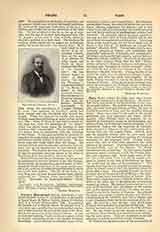

Fiacc, Saint (about 415-520), poet, chief bishop of Leinster, and founder of two churches. His father, Mac Dara, was prince of the Hy-Bairrche in the country around Carlow. His mother was sister of Dubhtach, the chief bard and brehon of Erin, the first of Patrick’s converts at Tara, and the apostle’s lifelong friend. Fiacc was a pupil to his uncle in the bardic profession and soon embraced the Faith. Subsequently, when Patrick came to Leinster, he sojourned at Dubhtach’s house in Hy-Kinsellagh and selected Fiacc, on Dubhtach’s recommendation, to be consecrated bishop for the converts of Leinster. Fiacc was then a widower; his wife had recently died, leaving him one son named Fiacre. Patrick gave him an alphabet written with his own hand, and Fiacc acquired with marvelous rapidity the learning necessary for the episcopal order. Patrick consecrated him, and in after time appointed him chief bishop of the province. Fiacc founded the church of Domnach-Fiech, east of the Barrow. Dr. Healy identifies its site at Kylebeg. To this church Patrick presented sacred vestments, a bell, the Pauline Epistles, and a pastoral staff. After many years of austere life in this place, Fiacc was led by angelic command to remove to the west of the Barrow, for there “he would find the place of his resurrection”. The legends state that he was directed to build his oratory where he should meet a hind, his refectory where he should find a boar. He consulted Patrick, the latter fixed the site of his new church at Sletty—”the high-land “—a mile and a half northwest of Carlow. Here Fiacc built a large monastery, which he ruled as abbot, while at the same time he governed the surrounding country as bishop. His annual Lenten retreat to the cave of Drum-Coblai and the rigors of his Lenten fast, on five barley loaves mixed with ashes, are mentioned in his life by Jocelyn of Furness. He suffered for many years from a painful disease, and Patrick, commiserating his infirmity, sent him a chariot and a pair of horses to help him in the visitation of the diocese. He lived to a very old age; sixty of his pious disciples were gathered to their rest before him. His festival has been always observed on the 12th of October. He was buried in his own church at Sletty, his son Fiacre, whom Patrick had ordained priest, occupying the same grave. They are mentioned in several calendars as jointly revered in certain churches.
St. Fiacc is the reputed author of the metrical life of St. Patrick in Irish, a document of undoubted antiquity and of prime importance as the earliest biography of the saint that has come down to us. A hymn on St. Brigid, “Audite virgins laudes”, has been sometimes attributed to him, but on insufficient grounds.
C. MULCAHY

